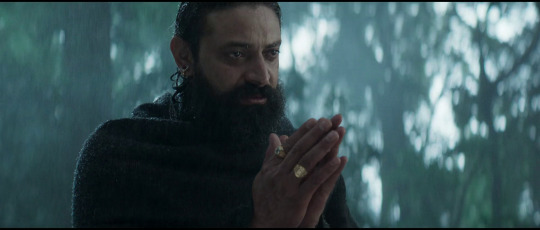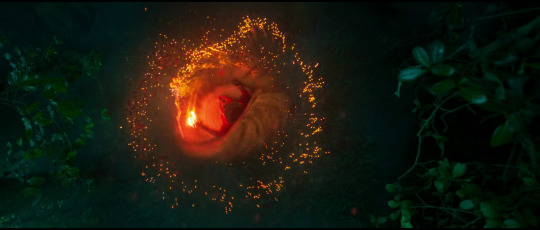#Kantara
Photo


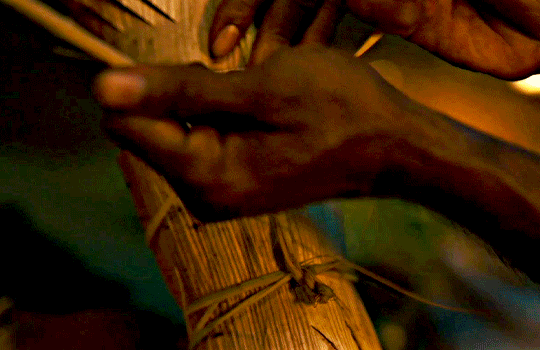


KANTARA - A LEGEND ಕಾಂತಾರ (2022) dir. Rishab Shetty
↳ requested by anonymous.
#kantara#rishab shetty#userfilm#chewieblog#filmgifs#dailyworldcinema#fyeahmovies#dilfgifs#dilfsource#mancandykings#userreds#cinematv#cinemapix#moviegifs#motionpicturesource#filmtvcentral#smudgedhenna#tvfilmsource#ours#by sj
159 notes
·
View notes
Text

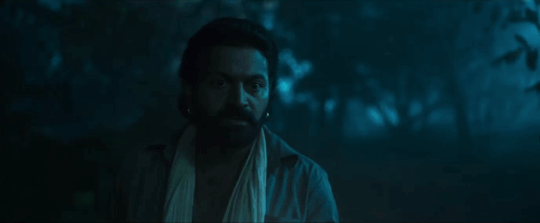
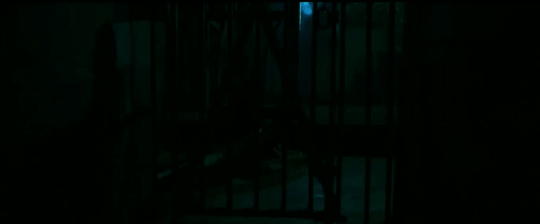
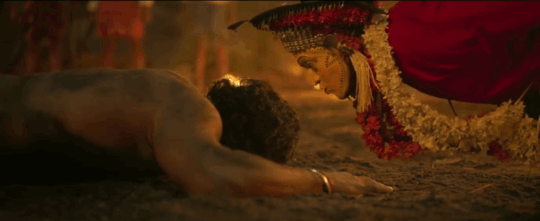
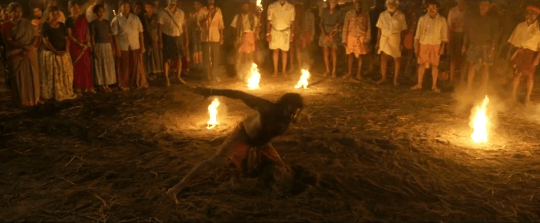
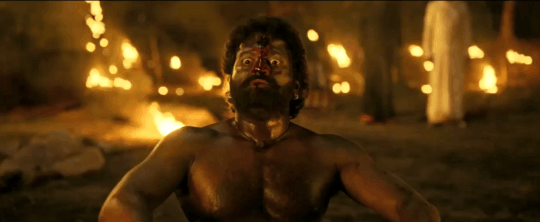
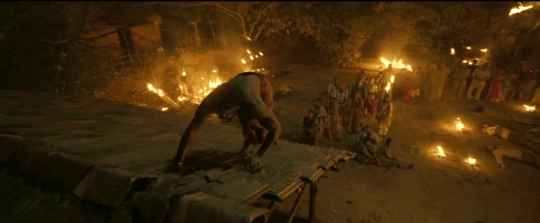
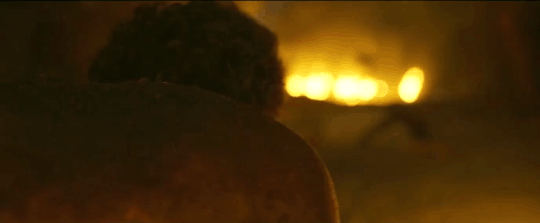
-Remember, I'll be accompanied by my companion, the ferocious Guliga. Should you err, even if I, Panjurli, forgive you, Guliga won't!
-My lord Panjurli has forgiven you, but I have not!
KANTARA (2022)
#kantara#sandalwood#rishab shetty#kya acting kya climax kya PICTURE#his acting as the gods was SO good and I like that panjurli and guliga were distinct even though the overall appearances were brief#adventures in gifmaking
181 notes
·
View notes
Text
A Movie Rant on a Fic Review blog (LMAO)
So, let me begin this post by saying I'm sorry for being MIA for nearly 2 years. I enrolled in a master's course and I've been majorly occupied by it. Honestly it's exhausting, tiring and it's making me question the way I look at the world every second of my life - I'd hate it completely if not for some of the few points I genuinely enjoy about it.
And it is one of those points I want to discuss in this post. Those few of you who are movie enthusiasts (no matter the language barrier) should have heard some whisper of a movie called 'Kantara' very recently. Today, I'm here to say that this is one of those movies from my home - from my very culture - that is making me proud of my roots. So I want to talk a bit about this movie, not as a review, but as a discussion of my culture and what it means to be showcased in such a context. So I apologise if it doesn't serve as a true review since I haven't really done one before.

'Kantara' (ಕಾಂತಾರ / kɑːⁿt̪ɑːrʌ), translated as 'mystical forest' is a Kannada-language Indian film and is set in contemporary times in Mangaluru in Karnataka and based on the traditions of that land. The reason I say 'land' is because the issue taken up in the film is about the ownership of land: of divine powers that dictate the lives of people living in a close-knit community living on the edges of forestlands, the powers of the state, and the power of greed of a man with respect to that land. The interplay of these factors is brilliantly shown in the film through the direction and screenplay as well as acting. Coming from the banner of Hombale films and director/actor Rishabh Shetty, Kantara makes brilliant use of a relatively simple plot - based on existing legends - through creative means and innovative storytelling that captures the viewer's attention throughout the film. It is comedic, thrilling, action-packed, and scary (in a few, perfect parts) but most importantly it captures the essence of the very issue it seeks to showcase: does divinity have any power over the modern lifestyles developed by work-and-wealth-centric societies?
In my religion and culture (Indic), we believe that nature and humans are equal participants in a healthy relationship which is why we respect and worship the wild. We believe in spirits of the land, descending from brave souls with divine powers, called 'demigods' and we worship them because they protect our existence and well-being. Since they are volatile beings, the rituals of appeasing them are sometimes garish and primitive, but they are also turned into art forms because of the centuries through which they have been performed. You might have heard of 'Diwali' (or Deepavali) and 'Dussehra' (or Dasara) which are widely celebrated festivals in India but we are a diverse land with multiple communities, each one having its own festivals. While I do not directly belong to the sub-culture discussed in the film, I do understand its core ideologies because they are similar to mine. 'Bhoota Kola' (Spirit Play/Ritual) (click on link to learn more about it) is one such celebration that is the subject of Kantara that my definition above describes (and which the above poster depicts too).
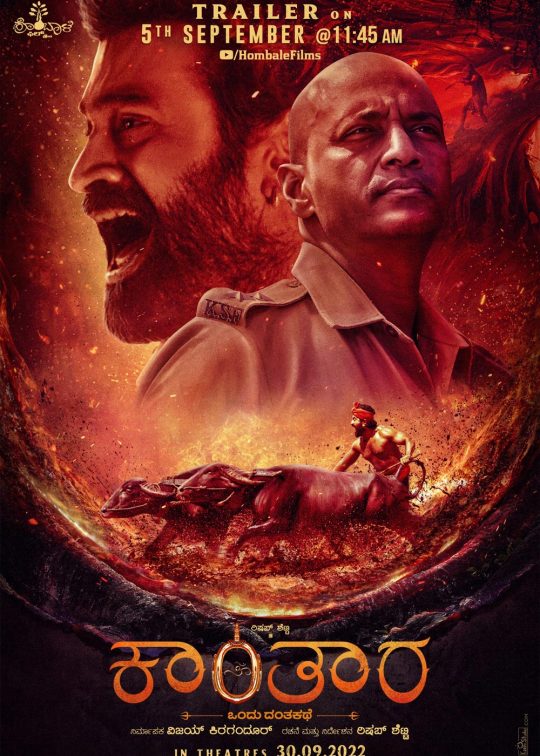
For the benefit of those who read this, if anyone will, I will not go into the plot of the film and stick to what I took away from it.
The first half of the film (pre-interval) builds the story, giving foundation to the plot and introducing the practices of the people while the second half (post-interval) more directly engages the viewers with the mystery of ownership, entitlement, and beliefs in divinity. The acting of Rishabh Shetty (Shiva, in the film) and others is instrumental in engaging the viewers and so are the sound effects (if a bit louder and harsher than I expected). What I found most impressive however were the visuals: the set, the costumes, and the filming in creative sequences that elevated normal scenarios. But the takeaway from this film, for me, was the thoughts it left me with.
The film asks very pointed and troubling questions: how influential is divinity in deciding who gets to live and how? Is it even relevant to the modern context for our beliefs to be justified? Why should one even have to believe in 'a' divinity to be a participant in a culture?
After coming out of the theater the only thing I could think of was, just how can we explain the things we term as 'mystical', 'magical', and 'bizarre'? If science - and psychology to an extent - cannot find an answer to these events, does it mean immediately that they are hoaxes? (I have a degree in Engineering which makes me a life-long discipline of the sciences, and I still have trouble believing in divinity but unexplainable events only serve to conclude such concepts can exist in the world)
There are many cultures across the globe similar to Indic culture that highlight the role of nature in the lives of people. But I am writing today as a member of the Indic culture, as a Kannadiga, which is alive in every action, and outlook of the world it inspires its members to have. I am proud to say that this film encapsulates the essence of culture, its importance, and its very imprint on societies. Rishabh Shetty, sir thank you for bringing such a film to life and for giving the world an opportunity to learn what our corner of the world has to offer to the magnificence that is life.
#Kantara#rishabh shetty#Kannada films#I absolutely would watch this film again and again and highly recommend that everyone watch it as well
53 notes
·
View notes
Text
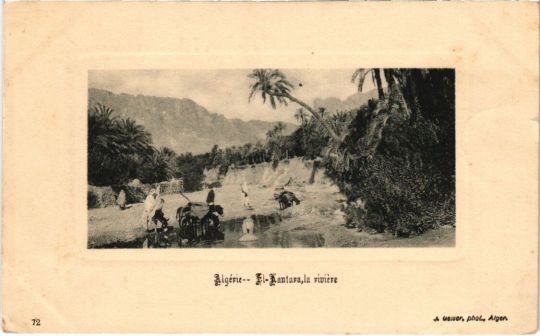
El-Kantara, Algeria
French vintage postcard
#el#carte postale#el-kantara#ephemera#photo#historic#postcard#tarjeta#postal#kantara#briefkaart#french#ansichtskarte#photography#vintage#postkaart#postkarte#old#sepia#algeria
17 notes
·
View notes
Text
I love the fact that movies/series/media content exists in a way that's mythically inaccurate in the context of the story, but accurate in the context of the character.
Has this happened in the books/stories/myths/legends/epics?
Nope.
Would the character do that if they were in that situation?
Absolutely.
#kantara#tale of the nine tailed#tale of the nine tailed 1938#totnt#totnt 1938#desiblr#indian tumblr#desi tumblr#asian#asiandrama#kdrama#cdrama#fanfic#epic
9 notes
·
View notes
Text
Grand Pa yelling, "Waa?" in complete disbelief that this innocent looking tiny grandson of his has been fooling him, drying him out of funds...reminds me of Kantara's devine chant "Waao!".
He is almost that loud, as if he needs to awaken an entire tribe, whole jungle. Do Joon is sitting right there, 2 feet away from him, calmly nodding, "Yup! That was me."
32 notes
·
View notes
Text
Quick colour study from Rishab Shetty’s ‘Kantara’ (2022)
45 notes
·
View notes
Photo
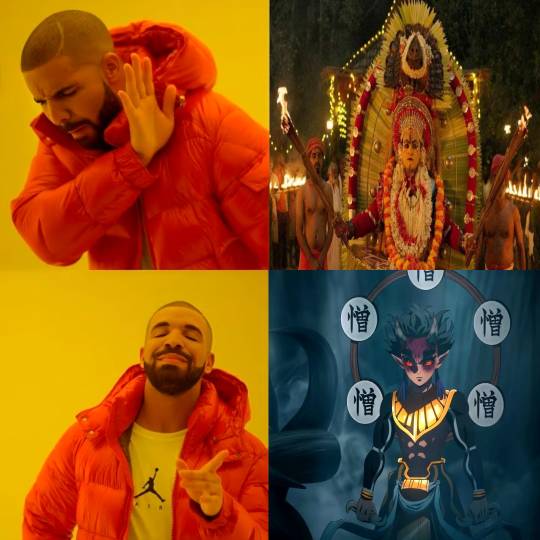
Kantara or Zohakuten , Meme by Weeblmao.com
8 notes
·
View notes
Text
Please subscribe to the channel:
https://m.youtube.com/channel/UC6CaRTnv-O6ppTJjPt3EhOQ
Thank you very very much!
45 notes
·
View notes
Text
Kantara has so many rich themes especially with ACAB, all landlords are bastards, caste, tribal rights, and how tribal religions are looked down upon when the shitty Hindu right wing think tank fuckers are not having counted them in as part of Hinduism, but
But
What I personally love about it and what gets very much downplayed in all the talk I've seen about the film is the theme of how being chosen by a god is very much also being haunted by a god.
19 notes
·
View notes
Text


KANTARA RAMBHEEM AGAIN IEJRBGIUEABTIPUEKEKEMEBTIUEBETIU
#rrr#bheemram#rrr movie#rambheem#ram charan#art#jr ntr#ntr jr#edit#rrr film#rrr fanart#rrr fandom#bheem#ram#kantara
17 notes
·
View notes
Text
On Culture, Diaspora, and Kantara

I watched Kantara (2022) over Thanksgiving after hearing about it for weeks from my family and friends, and I haven't been able to stop thinking about it since. It's a film that is particularly meaningful to me because my mother's side of the family hails from the region it was set in, Namely, Dakshina Kannada or the old South Canara in the state of Karnataka, India. This is where where bhoota kola is still practiced to this day.
The truth was, despite this movie being set in the land of my ancestors, I could relate very little on a physical level: These were rural villagers with minimal education living in a system of near-feudalism. I am.. not. Even the language was unfamiliar. My Kannada vocabulary can get me by when it comes to day-to-day activities, and it is insufficient if I want to consume Kannada media. In addition, because the dialect (or the accent) was true to the region, it made it more difficult for me to comprehend it. Neither my mother nor grandmother speak with the accent characteristic to the area (although they can if they want to communicate with locals), and even my father, who is not from the area but still from Karnataka, had to rely on subtitles.
There was also a matter of the culture itself. The thing about the aspects of the Dakshina Kannada culture shown in this film (kambala, boota kola) is that you'd only really be exposed to it if you lived in the area, or someone took the effort to purposefully educate you. That is because it is more of a folk culture. While I can say I am familiar with another local folk art, yakshagana (a form of dance-drama), that is because I grew up with stories of my great-grandfather, a noted yakshagana artist who brought his troop to the United States to tour. In addition, the practice of bhoota kola is not quite a part of the Hindu tradition I was raised in, specifically the Kannada Madhwa Brahmin tradition. I've read that bhoota kola and the notion of daivas is likely is a tradition practiced in the region long before Hinduism arrived.
To hear my mother matter-of-factly say that kambala (Buffalo races) and cock fights and bhoota kola occurred in her coastal village was startling. I suppose the reason she never mention it before was because she never actively went to kambalas (women from "good" families didn't go to events where there were drunk men; so she only saw the processions and parades before the actual event). As for the actual practice of bhoota kola, my grandmother admitted that when she was in around sixth grade, she snuck out of her house in the night to watch the bhoota kola. The old ancestral home in Bramhavara where she grew up was large enough for no one to notice the comings and goings of one girl. At a friend's house, she witnessed the ritual dance, and at some point, an offering of a live rooster was made to the daiva. The rooster's head was promptly snapped off its body. Eventually, my grandmother grew scared, and ran back home.
Regardless of how much I related to the villagers themselves, by the end of the film, I felt like I had a deeper understanding of my own cultural roots not only because of the film itself, but because of the greater context my family members were able to provide. But I also felt a certain amount of sadness. The thing is, I don't live where these rituals are practiced. In my lifetime, I have seen the Bramhavara house demolished, and relatives move away from their ancestral villages. My own parents moved across continents. I don't have the connection to the land that I imagine my ancestors did. At best, I feel fondness and an attachment to where I grew up, but there is no holiness in that, and a part of me wonders if I am missing out on something. I know migration is a natural part of human history, and perhaps this is the truth for any member of any diaspora, but still... I can't help but wonder.
When I finished watching Kantara, I came away entertained, thoughtful, and moved in equal measure. I felt a renewal of faith in a time I sorely needed it, not only in the classical sense, but all those holy protectors tied to the land.
#Kantara#rishabh shetty#kannada film#desiblr#desi tumblr#indian diaspora#kannada#karnataka#dakshina kannada#south canara
10 notes
·
View notes
Text
has anybody seen Kantara ??
14 notes
·
View notes
Text
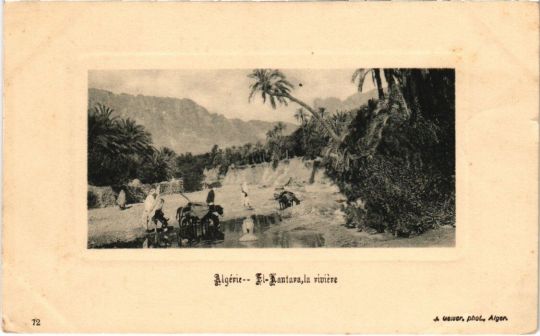
River in El Kantara, Algeria
French vintage postcard
#vintage#tarjeta#briefkaart#river#postcard#photography#kantara#postal#carte postale#sepia#ephemera#algeria#historic#el kantara#french#ansichtskarte#postkarte#postkaart#photo
2 notes
·
View notes
Text
so sick of people equating shit that is happy and divine as the only type of good media. this is exactly what’s happening with the whole navarasam vs varaha roopam situation.
ppl in thaikuddam bridge’s insta comments saying “it’s doesn’t matter that they copied you your song is depressing and theirs is happy and about god” shut up shut up SHUT UP.
JUST BECAUSE varaha roopam is about praising the divine (like loads of other songs) does not mean it is better than songs that draw attention to issues in the world. Navarasam is about how the art of kathakali and by extension other traditional ways of life and dances and etc etc are DYING and it is a song of lament. it’s got just as important a message as varaha roopam, just because it’s tragic doesn’t mean it’s not good. STOP equating divinity to media that trumps others.
7 notes
·
View notes
